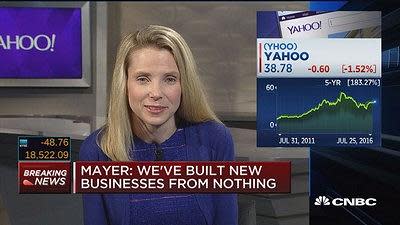The surprising link between Marissa Mayer's pay and Yahoo performance

Marissa Mayer has millions of reasons to celebrate her job at Yahoo. The CEO's future may be in question, but she's already earned over $100 million in reported compensation from the search giant over the past four years at the helm. (And that doesn't include the $55 million she's due if she steps down.)
But is "earned" the right word? Verizon's (VZ) purchase of Yahoo (YHOO) offers a good opportunity to see how Mayer's tenure as CEO compared on a pay-for-performance basis to past Yahoo chiefs.
Generally speaking, Yahoo CEOs have a median reported compensation of $36 million per year, going all the way back to 1997, and that was Mayer's 2015 reported compensation, which ranked her at No. 11 among U.S. CEOs, according to Equilar.
The relationship between reported pay and performance at Yahoo has been tenuous at best, with a (very) small statistical correlation, with an "R-squared" measure of 0.0063 (where zero is no correlation, and one is perfect correlation.)
An examination of CEO pay against trailing three-year return on a year-by-year basis going back to 1999 indicates little correlation between compensation and performance, as shown by data from S&P Global Market Intelligence. It's not adjusted for inflation, and it must make approximations based on the fact that the SEC changed reporting requirements in 2006. It's also reported compensation, which doesn't mean Mayer gets a check for $36 million at the end of the year. It's the earnings goal an executive could get, usually based on stock performance.
In Mayer's case, Yahoo stock has gone up during her tenure. That wasn't necessarily true for past CEOs like Carol Bartz and Jerry Yang, who saw big down years running the company.
A Yahoo spokesperson explained to CNBC that Mayer's actual, realized compensation was only $14 million — much lower than the reported compensation of $36 million. The big difference came because the company fell short of some performance goals, causing Mayer and other executives to lose out on performance-based pay.
There have been a lot of studies trying to compare executive compensation with company performance. The logic is that higher-paid CEOs should be able to steer their companies to more profitable outcomes. Part of that came about 30 years ago, when many U.S. companies switched to offering incentives and stocks options as part of executive pay packages.
But a new study released Monday by MSCI ESG Research suggests that companies with lower-paid CEOs actually outperform their high-paid-executive counterparts. Specifically, the companies in the top 20 percent of highest paid CEOs saw much lower stock returns in a 10-year period than the 20 percent of companies who had the lowest paid CEOs.
The study found that $100 invested in companies that pay their CEOs at the high end would return $265 over that 10 years. That same $100 invested in the bottom fifth of companies when ranked by total pay would have returned $367.
A lot of research has been done into pay-for-performance, including by CNBC . But these studies usually look at a short time frame like a year of performance compared to pay.
The MSCI study includes pay for over 800 individual CEOs at 429 different large- and mid-sized companies companies.
MSCI also considered broader economic sectors and found basically the same result: CEOs who had compensation in the top half of a sector tended to run companies that performed worse than the CEOs who were paid in the lower half.
Many other studies have shown little relationship between CEO pay and one-year stock performance. Other studies have recommended that longer time periods be used to have better analysis, like a three-year or five-year time horizon.
Disclosure: CNBC has a content-sharing partnership with Yahoo's finance site.
More From CNBC
Top News and Analysis
Latest News Video
Personal Finance

 Yahoo Finance
Yahoo Finance 
